Binghamton University students know that what the town lacks in action and entertainment, the school more than makes up for in clubs and organizations. Because there is such a need for on-campus fun, the sheer amount of activities can sometimes be overwhelming and difficult to sift through.
In fact, when searching for something to do, many students end up overlooking opportunities that are relevant to their own interests. That being said, if one of your interests is food, then look no further. We introduce the Food Co-Op, a student-run business in the Roots Cafe (in the basement of the University Union-UU030) that provides local, organic, non-Sodexo food.
The Co-Op, around since 1975, is one of the most underrated spots on the entire Binghamton campus, mostly because of the diverse ways in which students can use the space.
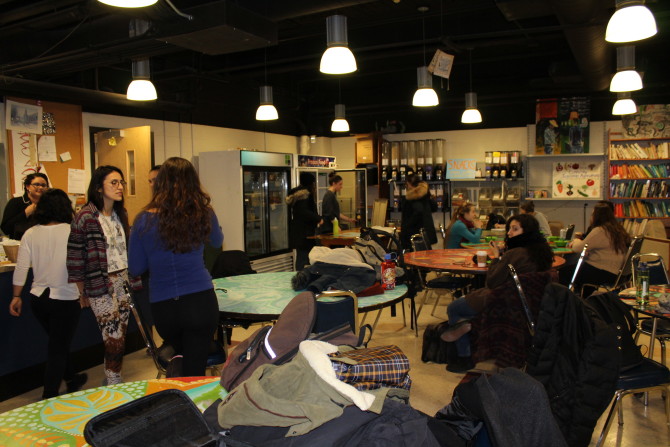
Photo by Christina Millan
Whether it’s cooking, eating, snacking, studying, making new friends, or even just hanging out and relaxing, the co-op has got you.
One of my favorite parts of waking up and getting ready on a Friday morning is knowing that I’m about to spend the next couple of hours cooking good, real food with some really nice people in an extraordinary kitchen.
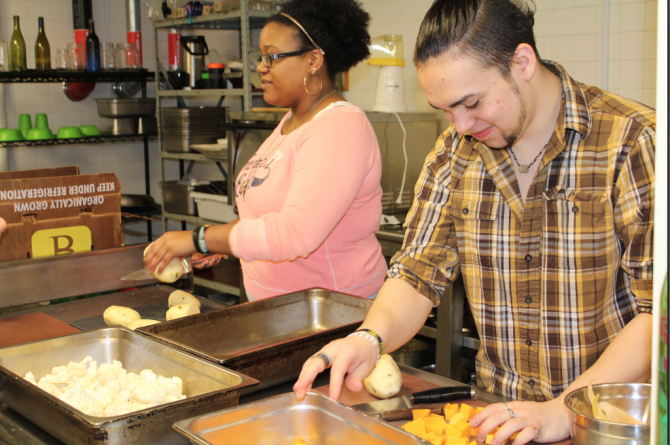
Photo by Christina Millan
I discovered the Food Co-Op through chance and and realized just how easy it is to be a part of. Anyone can show up, whenever the Co-Op has cooking hours to help cook, and they can stay for as long as they want or leave whenever they need to.
Of course, if you’re looking for a more committed activity, then the Co-Op offers a plan to integrate you as a paid cook. You can also work towards becoming a part of the Co-Op’s E-board, should you desire.
Another way to get involved is to work the storefront. Whenever the store is open, whether serving the food that has been cooked or simply selling its various delectable goods, anyone can hop in and be trained to work the register. Volunteer or member, it’s a great way to socialize and be a part of something bigger.
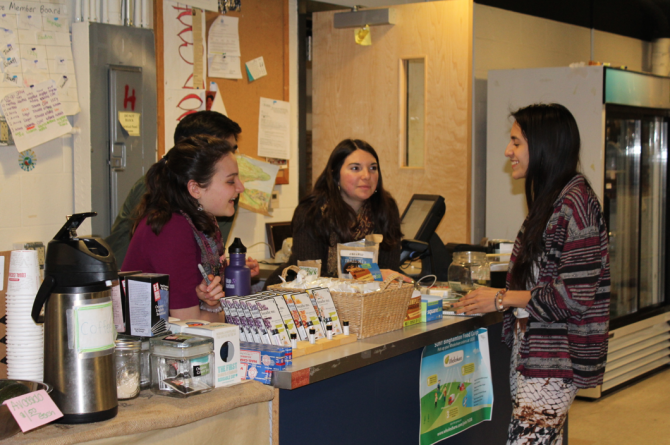
Photo by Christina Millan
My interview with the co-op’s standing president since the fall of 2015, Jowell Padro, reveals just how diverse the room is and how important the Co-Op is.
Jowell says, “I discovered the Co-Op during the first semester of my freshman year. I Googled ‘healthy food at Binghamton University’ and found the Yelp review. I checked it out and became a volunteer the same day. I washed dishes 2-3 times a week for a semester before officially joining the E-board.”
Pro Tip: Washing dishes actually gets you a discount at the store.
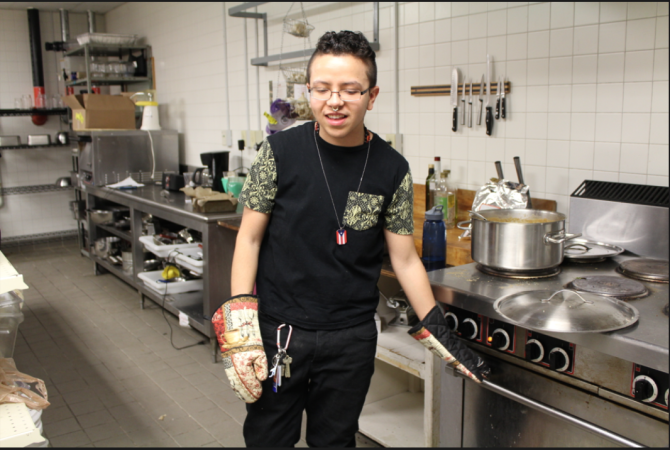
Photo by Christina Millan
I asked Jowell why he likes the food co-op, and he responded, “The most obvious thing I like about it is the food! It’s delicious and affordable. We do our best to make sure everything we make is gluten-free and vegan, so as many people as possible can enjoy our food.” The Co-Op is also completely organic.
“I have Celiac disease, so finding gluten-free options on campus is limited. I love that I can always rely on the Co-Op for something gluten-free.”
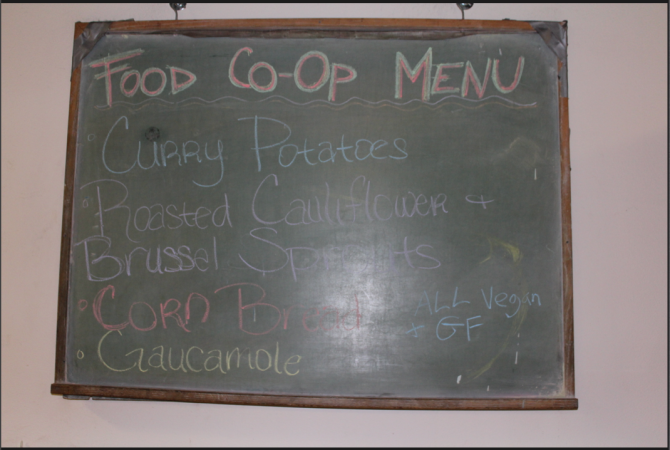
Photo by Christina Millan
When asked what means the most to him about this place, Jowell explained that the Co-Op is committed “in supporting ethical labor and small businesses.” Products from local businesses and farms are sold in the storefront.
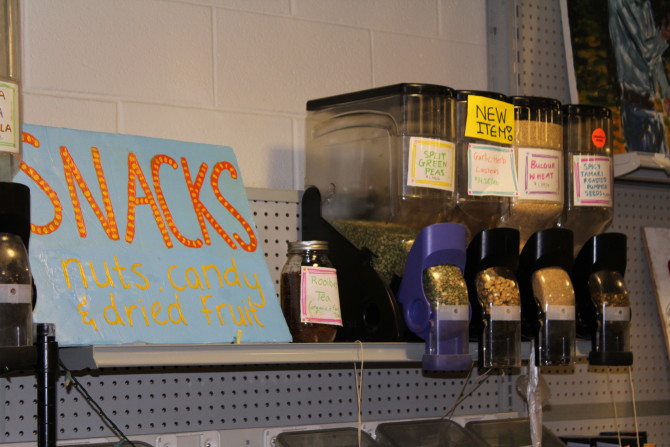
Photo by Christina Millan
Jowell explained that “A lot of people don’t realize how our current food and agricultural system is informed by the legacy of the Atlantic Slave Trade, colonialism, and globalization.”
“For example, the Indigenous people would grow corn, beans, and squash together on a small scale to nourish and flourish each other. Plantation slavery completely changed this practice.”
“Everything from the way we literally grow food to the way we trade it began this way, and it is clear that those exploitative, environment-destroying ways of producing food have continued into the present.”
“I like to think of the Co-Op, and all Co-Ops, as being actors in the decolonial project.”
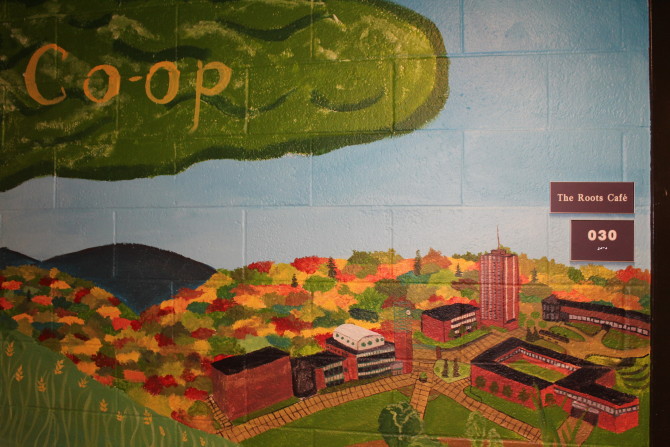
Photo by Christina Millan
One of my most important questions for Jowell was why he felt more people did not know about the Co-Op. Jowell explained that the food-conscious community was sometimes both isolating and isolated. He also explained that the location of the Co-Op is in a place that most people won’t stumble by, and most people who do come across it are just passing by.
When I asked Jowell about the atmosphere of the Co-Op, he explained more about the diversity within the Roots Cafe.
“You can expect music and to see everyone! Literally. Students of all backgrounds, professors, Binghamton locals, and various university employees spend time in the Co-Op. We also serve as an alternative social space, so you’ll see people studying, playing guitar, having meetings, and eating. Anyone is welcome to hang out.”
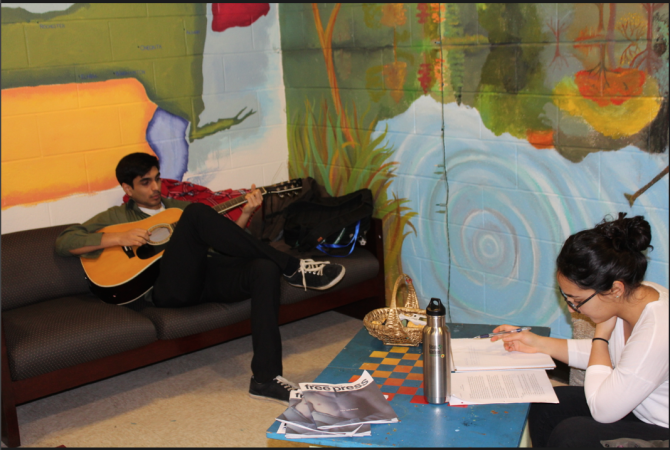
Photo by Christina Millan
Angelique Baehr is a Co-Op E-board member who works storefront and treasury. I asked her a little bit about the flow of people in the Co-Op. She explained that Tuesdays and Thursdays tend to be busier, since more people are on campus for class these days.
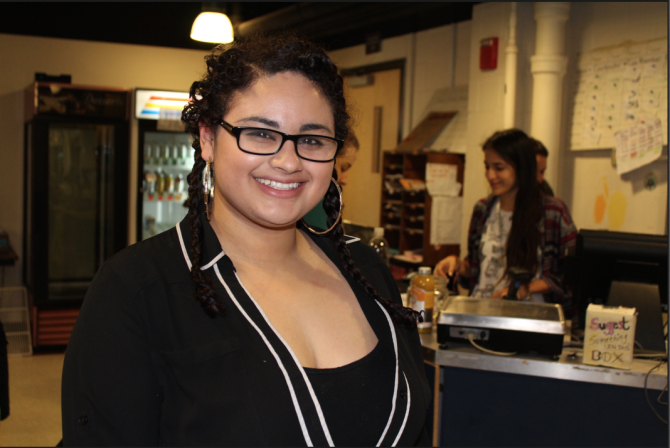
Photo by Christina Millan
She gave me some insight as to how the Co-Op pays for all that they offer. “We do get a budget from SA, and with the money we make from the store, we purchase more food.”
“Our main vendor is UNFI United Natural Foods for storefront and some kitchen ingredients, but produce is from Albert Organics in New Hampshire. During the fall, we get shares through Early Morning Farm about 45 minutes away, and it’s all seasonal stuff.”
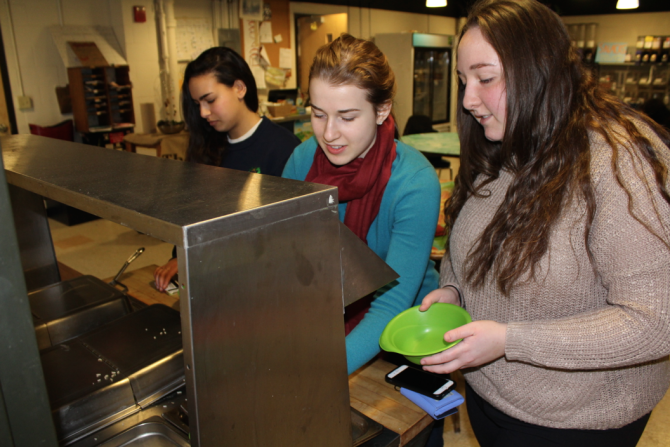
Photo by Christina Millan
I also made sure to ask a few students for their opinions on the Co-Op. Sharon Elkouby (to the far left) has been to the Co-Op before and has even volunteered at cooking and storefront.
I asked her what she thought of the spot’s unique look. “The tables are lovely and the walls and tapestry creates a nice environment that feels very organic and that cares about the earth.
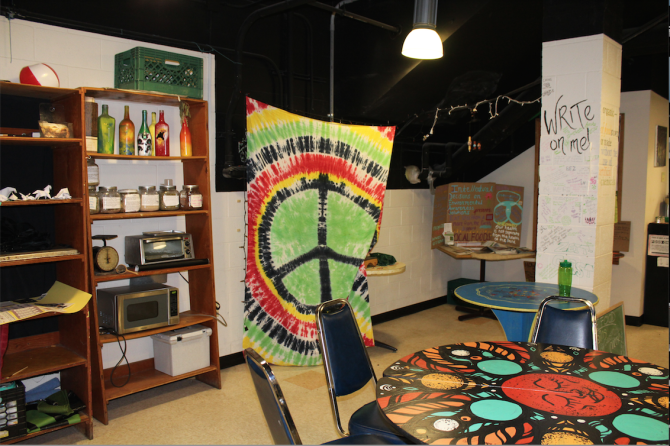
Photo by Christina Millan
Her two friends, Frances Fuks and Yael Lissack, were from out of town, visiting, and they agreed that the co-op seemed like a cool working place, and that “everyone should hit up the Food Co-Op” and that the food is “really good”.
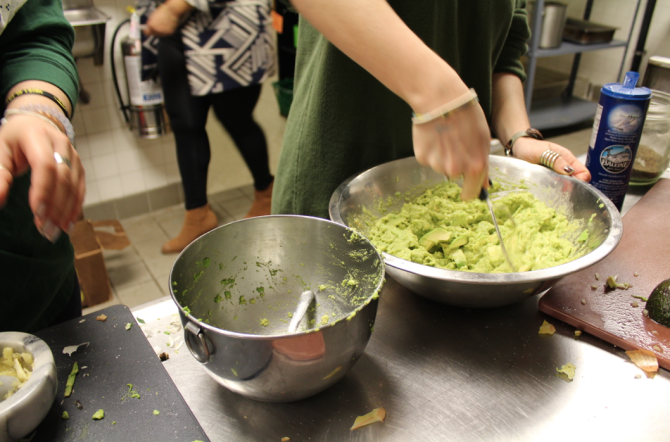
Photo by Sasha Reiter
I’ll be the first person to say it, if you want on-campus food this bright and colorful, you’re gonna need to get yourself down to the Co-Op.


